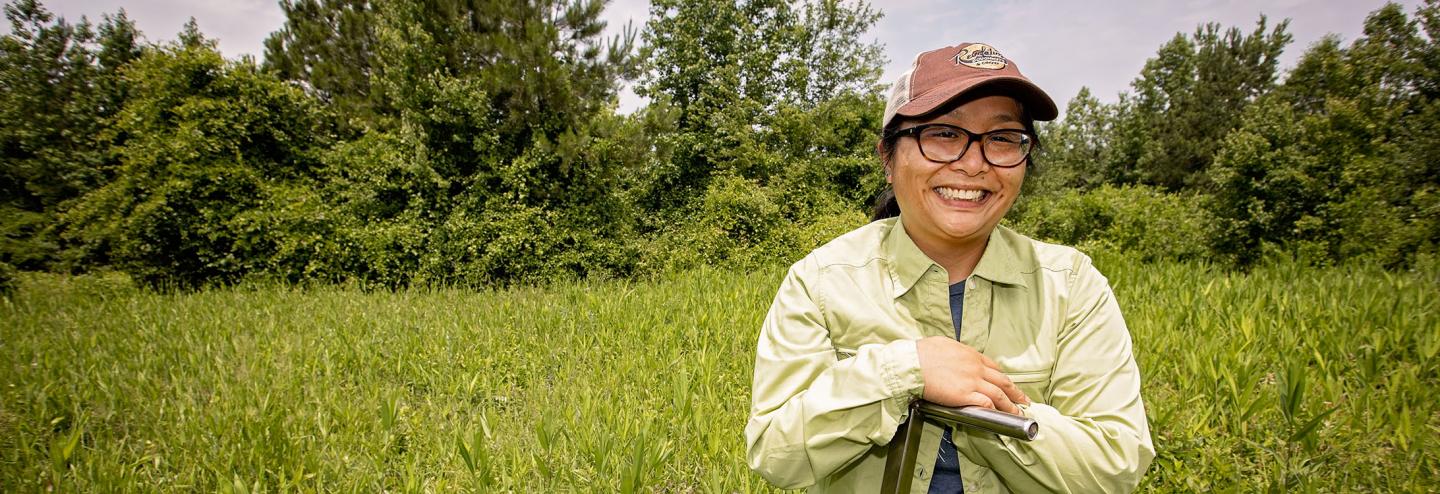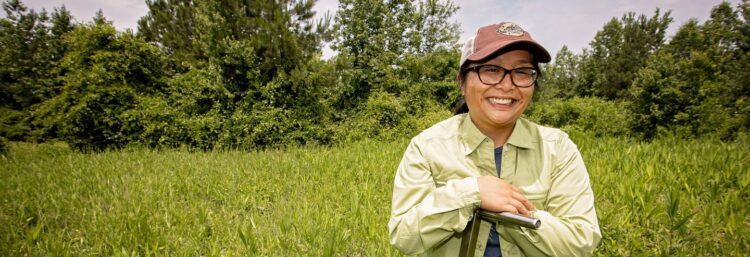East Carolina University research team awarded $1.5M grant to study watershed resiliency

Credit: Cliff Hollis/ECU
A nearly $1.5 million grant awarded to an East Carolina University research team by the National Science Foundation combines science and economic policy to support eastern North Carolina’s environment, farmers and rural communities.
The four-year study aims to determine how environmental changes modify nutrient pollution in the Tar-Pamlico River Basin. The study also examines how local, state and federal nutrient management policies influence water quality now and in a saltier, wetter future.
Associate professor of biology Ariane Peralta leads the interdisciplinary research team, which includes faculty from ECU’s biology, anthropology, coastal studies, economics and engineering departments. Peralta said one of the main focuses of the study will be predicting how future environmental changes, like sea level rise, will influence how microorganisms process nitrogen on farm fields and lead to increased nutrient pollution levels downstream.
“When we typically think of agricultural pollution, we think of things like fertilizer or animal manure runoff,” Peralta said. “But other environmental stressors, like saltwater from sea level rise or saltwater intrusion from groundwater, create natural hazards that can affect crop production and worsen nutrient runoff at the coast.
“Sea level rise may cause short-term and eventually chronic stress to a farmer’s crop,” she said. “These salinization events can also stress soil microbes, which can reduce microbial nitrogen cycling and lead to increased nutrient runoff into surface waters. It’s imperative that we understand how land-use management practices that are used today will affect crop production and downstream water quality in a saltier, stormier world.”
Over the next 15 years, scientists expect North Carolina’s sea level to rise by 6 inches, according to the U.S. Army Corps of Engineers. The grant team will collect soil samples from farm fields and adjacent wetland areas to measure how increasing concentrations of saltwater will affect microbial processing of nitrogen. These experiments will show researchers how soil microbes respond to increased salt levels and how water quality functions are expected to change.
“We want to know what the microbes in our soil are doing when they’re exposed to greater salt levels,” Peralta said. “Will greater levels of salt interrupt the processes microbes use to transform nitrate and ammonium from fertilizers into nitrogen gas? We want to know how salt modifies soil microbes on croplands and alters pollution levels in eastern North Carolina waterways.”
In addition to studying how environmental hazards affect environmental conditions, the research team will use surveys to better understand how policies and incentive programs can increase the use of best management practices carried out by farmers in the region. These surveys will help the team understand what motivates farmers to implement new land-use practices to combat the effects of pollution.
These best management practices, which may include transitioning land used for farming to fallow land to allow for nutrient recovery or changing crop production type, may be more likely to be used when they provide an economic or societal benefit for the farmer.
“These surveys will help us figure out what incentives we can offer farmers to motivate them to implement management practices that both support crop production and reduce nutrient runoff,” said Randall Etheridge, an assistant engineering professor on the team. “We’re trying to work together to find a balance for what’s best for the farmer and the environment to face these upcoming natural hazards.”
The study, which features two dozen undergraduate and graduate students, will also provide data to K-12 classrooms throughout the state.
“We’re going to use some of the knowledge and data we collect to share with North Carolina public school teachers and students in grades 3-5,” Peralta said. “We will collaborate with in-service teachers to develop lessons about natural hazards that can affect the environment. Saltwater intrusion and sea level rise are not only happening in eastern North Carolina. These are environmental challenges that apply to coastal farmers across the country and globally.”
Etheridge added that incorporating the input of eastern North Carolina farmers through surveys and interviews is vital for the study’s outcomes to take root.
“We can sit here all day and model what’s going to work, but if we do not reach out to our farmers and find out what they’re willing to implement, then the research isn’t really effective,” he said. “We have to work directly with the communities this research affects to determine the best way to apply our results.”
The research team also includes professor David Griffith, anthropology and coastal studies; professor Enrique Reyes, biology; and associate professor Greg Howard, economics.
The project will begin in March and run through 2025.
###
Media Contact
Matthew Smith
[email protected]
Original Source
https:/





